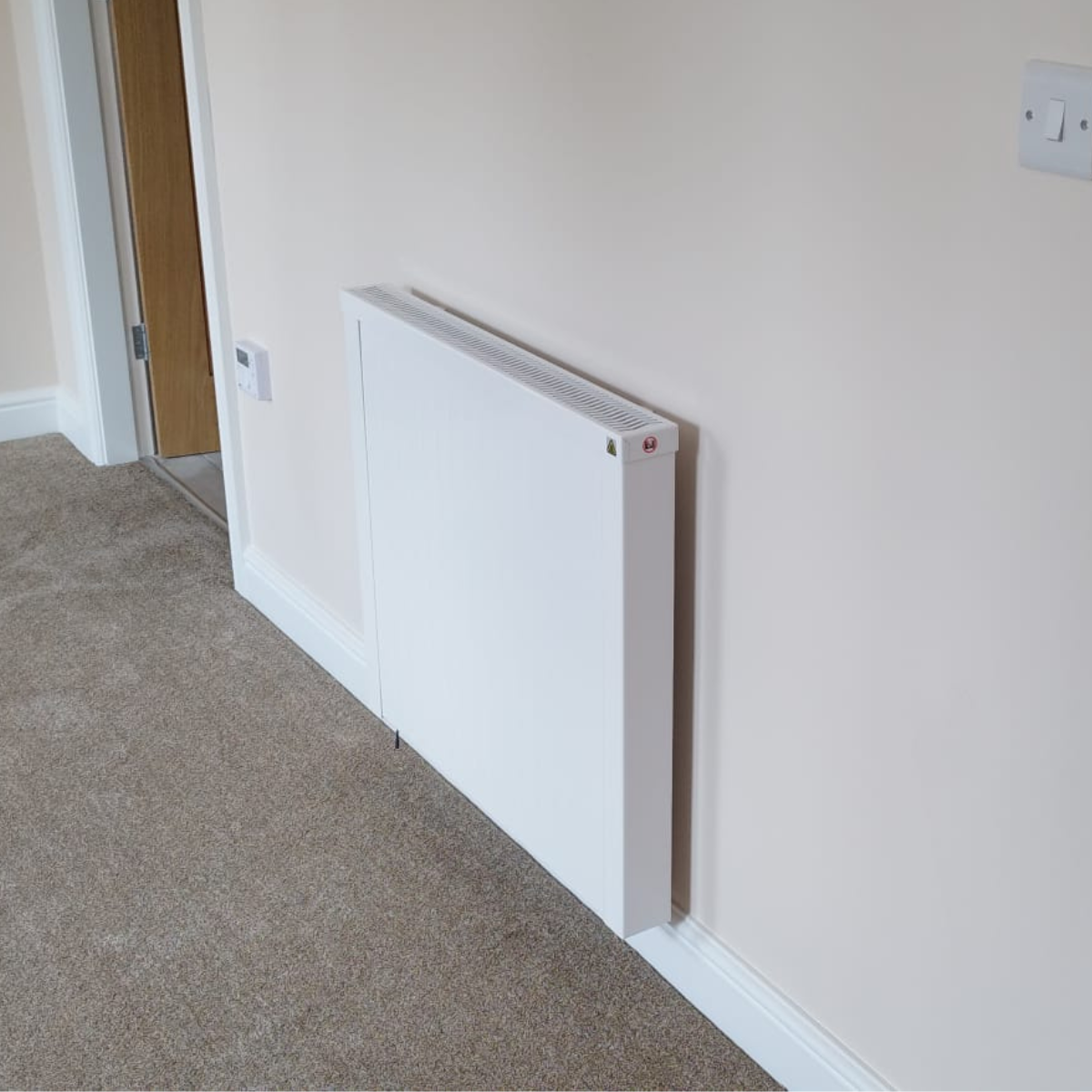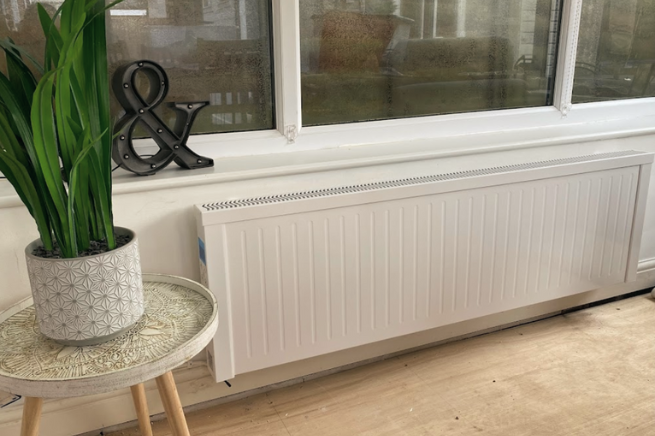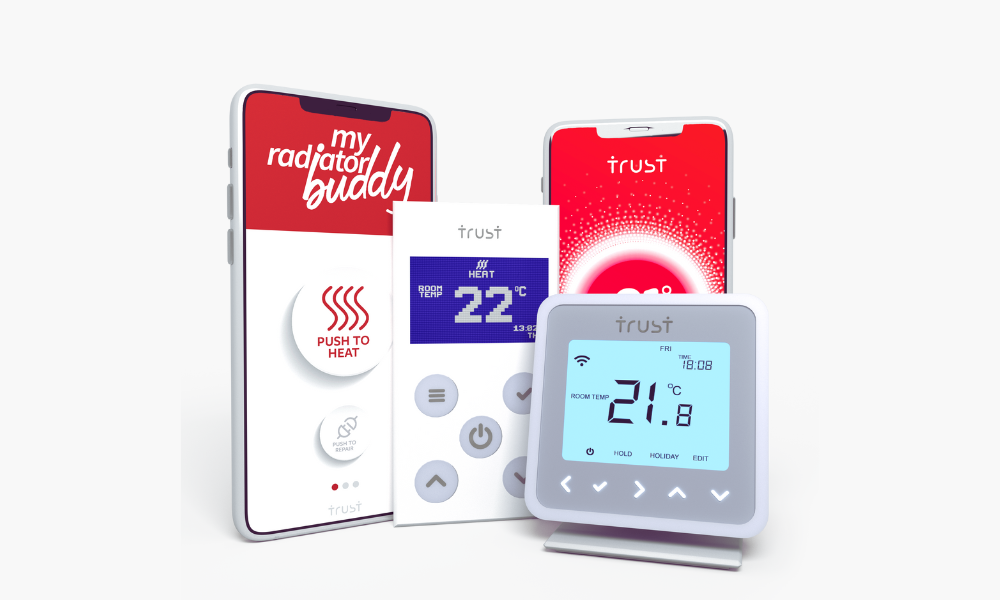
As an electric heating company, one of the most frequently asked questions we get is “How much do electric radiators cost to run?”. And it’s a valid concern, especially while we are all looking for ways to manage our household budgets and energy bills more effectively. While you may think electric heating is expensive, modern electric radiators have evolved significantly. Electric radiators now offer advanced features that aim to reduce energy consumption while still keeping your home warm. Among these, models like the NEOS stand out with state-of-the-art features designed to maximise warmth while minimising costs.
Sounds too good to be true right? Well, at Trust Electric Heating, we are all about educating our customers on electric radiators, so we’ve crafted this blog to help you understand how electric radiators can be the cost-effective and energy-efficient choice for your home.

Before diving into the nitty-gritty of running costs of electric radiators, let’s take a moment to appreciate how your electric radiator brings warmth to your chilly mornings and cosy evenings. In simple terms, these handy devices work by converting electricity directly into heat—think of it as turning cold, hard energy into a warm embrace for your home. It’s this straightforward efficiency that makes electric radiators a game changer in heating.
Knowing just how your radiator turns electricity into heat isn’t just a fun fact—it’s key to understanding why and how you can manage your heating costs effectively. With their direct heating approach, most electric radiators allow for precise control over your room’s temperature. This means you have the power to dial in the exact level of comfort you need, when you need it, saving you money by not overheating your space. So, as we explore the costs associated with running an electric radiator, remember that the control is in your hands. Your radiator isn’t just a source of heat; it’s a tool for making your home more energy-efficient and your bills more manageable. Let’s keep this in mind as we break down the costs of keeping warm with electric radiators.

Now, let’s delve a bit deeper into energy efficiency. Electric radiators are like having a personal energy manager in your home. They ensure that no watt of electricity goes to waste, converting every bit into usable, comfortable heat. This efficiency is crucial, not only for keeping you warm but also for ensuring that your energy bills stay manageable. The beauty of electric radiators lies in their ability to provide targeted warmth. Unlike traditional systems that may heat areas unnecessarily, electric radiators focus on heating your space efficiently and effectively. This targeted approach means you’re not spending extra on heating unused spaces, making electric radiators a smart choice for conscious consumers looking to save on energy costs.
So, as we explore the costs associated with running an electric radiator, remember that the control is in your hands. Your radiator isn’t just a source of heat; it’s a tool for making your home more energy-efficient and your bills more manageable. By optimizing how and when you use your electric radiator, you can enjoy the warmth it provides without worrying about excessive energy use. Let’s keep this efficiency in mind as we break down the costs of keeping warm with electric radiators, and remember, smart heating choices lead to a warm, comfortable home and savings on your energy bills.

Alright, let’s talk about the elephant in the room: How much does it cost to run an electric radiator? When it comes to heating your space with an electric radiator, one of the first questions that pops up is, “How much is this going to cost me?” It’s a fair question, especially when you’re trying to keep your home cosy without breaking the bank. Let’s break it down in a way that’s easy to understand and apply to your own situation.
The cost of running an electric radiator is influenced by several factors, including the radiator’s efficiency, the cost of electricity in your area, and how you use the heater. The beauty of electric radiators, especially models like the NEOS, is their design and technology, which are geared towards minimising energy consumption while maximising warmth.
To calculate the estimated running cost and costs of full power on your electric radiator accurately, you can use a simple formula:
Running cost (in pounds per hour) = Wattage of the radiator (in kW) × Electricity rate (in £/kWh)
For example, if your own electric heater radiator has a wattage of 1.5 kW, and your electricity rate is £0.30/kWh, the estimated electric heater running cost per hour would be:
Running cost = 1.5 kW × £0.30/kWh = £0.45 per hour
When it comes to electric radiators, the initial focus tends to be on the immediate cost of running them. However, the true value lies in the potential savings over time, both in terms of energy and money. Electric radiators, especially those equipped with the latest technology, offer a plethora of features designed to maximise efficiency and minimise costs.

Modern electric radiators come packed with features like programmable thermostats precise temperature control, and superior insulation materials, which are key to unlocking these savings. Our Running Cost Guide underscores the importance of considering the long-term savings on running costs alongside the initial purchase price. By choosing a high-efficiency model such as the NEOS, you’re not just getting a source of heat; you’re investing in a cost-effective heating solution.
The secret to enhancing these savings lies in smart usage:
Adjust the Thermostat: Tailor the thermostat settings to your actual needs, avoiding overuse and unnecessary heating.
Utilise Timers: Make the most of timers to ensure your electric radiator is operational only when needed, which prevents energy wastage.
Zone Heating: Heat only the spaces that are in use. There’s no need to warm up an empty room, and by focusing on occupied areas, you can significantly reduce energy consumption.
While it’s natural to concern yourself with the immediate costs of installing an electric radiator, shifting your focus to the long-term can reveal the true benefits. An efficient electric radiator like the NEOS not only provides warmth but does so while saving energy and in the most economical way possible. Through conscious adjustments to how and when you use your radiator, you can significantly lower your energy usage and, by extension, your heating bills.
In essence, the question isn’t just “How much will it cost to run?” but rather “How much can I save with an electric radiator?” With a mindful approach to your heating needs and the strategic use of your radiator’s features, the savings can be substantial. Electric radiators offer an opportunity not just for a warm and comfortable home but for a more energy-efficient and cost-effective central heating solution.

As we’ve journeyed through the ins and outs of electric radiators and their running costs, it’s clear that choosing the right radiator can significantly impact both your comfort and your wallet. The NEOS, with its innovative design and energy-saving technology, stands as a beacon for those seeking efficient, cost-effective heating solutions. Its innovative technology, including it’s soapstone core, aluminium casing, and patented Quadvex Technology work together to not only cater to your heating needs but also promise substantial savings on your energy bills. To read more about how the NEOS works, you can download our FREE brochure here.
The NEOS exemplifies how electric radiators have evolved beyond mere heating devices into smart, energy-efficient solutions for modern living. By prioritising efficiency and user control, the NEOS ensures that you enjoy a warm, comfortable home without unnecessary energy use or inflated bills. And what’s better, these facts are backed by science! We tested our NEOS through our knowledge transfer partnership with the University of Huddersfield, and created a Running Cost Guide.
Ready to see how the NEOS can transform your heating experience and help you save on running costs? Why not download our comprehensive Running Cost Guide? This guide is your key to unlocking detailed insights into the efficiency and savings potential of electric radiators, featuring models such as oil-filled radiators, panel heaters, German radiators, and the NEOS.
By choosing NEOS, you’re not just selecting a heating solution; you’re choosing a path to a warmer, more efficient, and cost-effective future. Dive into our Running Cost Guide today and discover the NEOS difference for yourself. Welcome to the future of home heating.
While all electric radiators may be 100% efficient in the way that they convert every kw of energy into heat, models like the NEOS will warm your room faster meaning you won’t need to use the same amount of electricity to generate the same amount of heat.
For more detail on this, check out our blog on which electric heating is more efficient?
You can use this simple formula to work out your electric radiator running costs:
Running cost (in pounds per hour) = Wattage of the radiator (in kW) × Electricity rate (in £/kWh)
Yes, this is possible if depending on the style of electric heating you have and how you use it.
For example, if you have an electric fan heater which uses electricity 100% of the time it’s generating heat, you’re not going to save money. But opting for heaters with storage cores, such and a modern storage heater like the NEOS, you’re radiator won’t use constant electricity to emit heat. Our running cost guide explains this in more detail.
Depending on the type of electric radiator, and how you use it, you can save money long term on your heating bills. Dive into our running cost guide which includes case studies on different electric heating methods such as oil filled heaters, radiators, panel heaters, German radiators, and the NEOS. For each type of electric radiator you can find running cost’s over a year, and 25 years.
Electric radiators boast several efficiency advantages over traditional heating systems:
Direct Energy Conversion: They convert 100% of the electrical energy into heat, minimising waste. Traditional systems often lose energy through combustion and distribution.
Precision Heating: Electric radiators enable room-by-room temperature control, allowing for heating only where needed, unlike central systems that heat the entire home.
No Duct Loss: Direct room heating eliminates the heat loss common in ductwork of traditional systems, enhancing efficiency.
Immediate Warmth: They offer quick heat when needed, avoiding the standby energy consumption required by boilers in traditional systems.
Low Maintenance: Electric radiators maintain their efficiency over time with minimal upkeep, while traditional systems can degrade due to leaks or sediment buildup.
Renewable Energy Compatibility: When used with renewable sources like solar panels, electric radiators can be even more environmentally friendly than fossil fuel-dependent systems.
The efficiency of electric radiators is directly influenced by room size and insulation quality. Larger rooms or spaces with poor insulation require more energy to maintain a comfortable temperature, as heat escapes more easily. Well-insulated rooms retain heat better, making electric radiators more effective and energy-efficient as they need to run less frequently to keep the room warm. Optimal insulation and appropriate sizing of the radiator for the room ensure maximum efficiency, minimizing energy usage and costs.
Electric radiators are ideal for zone heating, allowing you to heat individual rooms or areas based on occupancy and usage patterns. To implement zone heating:
Install electric radiators in the rooms you use most frequently.
Use thermostats to set different temperatures for each zone or room according to your comfort and schedule.
Only heat the zones in use, reducing energy consumption by not heating unoccupied spaces. This targeted approach enhances comfort and reduces energy waste, leading to significant savings on heating bills.
Electric radiators require minimal maintenance compared to traditional heating systems. To ensure they operate efficiently:
Regularly clean the radiator surface to prevent dust buildup, which can impede heat output.
Inspect the thermostat and timers to ensure they are functioning correctly.
Beyond these simple steps, electric radiators do not require the annual servicing or safety checks needed for gas or oil heating systems, making them a convenient and low-maintenance option for home heating.
For more frequently asked questions, you can visit our FAQ section here.
Tags: General Guides.

If you are considering electric heating/electric radiators, then this guide tells you everything you need to know. Discover this modern, sustainable and economical method of heating that gives you complete control and comfort. Download Free Guide now.

*Trust Electric Heating needs the contact information you provide to us to contact you about our products and services. You may unsubscribe from these communications at any time. For information on how to unsubscribe, as well as our privacy practices and commitment to protecting your privacy, check out our Privacy Policy.
Quick installation and a 100 day warmth guarantee. Whether you’re buying one or several radiators, if our radiators don’t heat your room to a minimum of 20 degrees we will undertake to upgrade or replace the radiators free of charge.
Book your free consultation